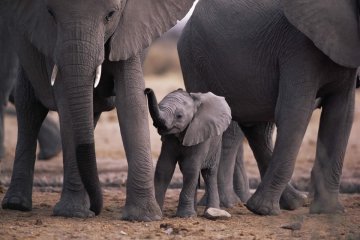Elephant Calf
Female adult elephants give birth to a single elephant calf at any time of the year. During its infancy, the calf is cared for and raised by its mother and other females in the herd.
Birth
At birth, an elephant calf weighs 170 to about 250 pounds, with an average height of about 36 inches at the shoulder. Male African elephants may be heavier, and can weigh up to about 360 pounds.
Immediately after birth, the calf is helped by its mother and other females to stand on its feet. Within minutes, it is able to stand without assistance. This is necessary for survival as the calf needs to stand in order to be nursed. After one to two hours, the calf can walk on its own.
Nursing
Almost as soon as the elephant calf is born, its mother encourages it to start nursing. Since the newborn calf's trunk is still rather short at this stage, the mouth is used for nursing. Calves depend almost entirely on milk for the first six months.
The milk contains high amounts of fat and protein, and the average daily intake of milk for calves is around two gallons a day. Calves may nurse from other female elephants in the herd as well.
Development and Interaction
Calves gain enough strength to join the herd within two days of birth. During this time, the herd is often waiting for the mother and calf nearby. As well as the mother, the other females in the herd play an important role in the calf's development.
This includes the calf's aunts, sisters, and the female herd leader, or matriarch. The herd modifies its pace so that the calf can move along with them. The young calf is constantly shown affection from its mothers and aunts, who helps it out and gives it guidance.
Diet and Weaning
Between four and six months, calves start to use their trunks to pick leaves and grass to eat. As they start to eat more vegetation, calves are gradually weaned from milk. Weaning is not complete until the calf is more than two years old and weighs about 1900 to 2000 pounds.

